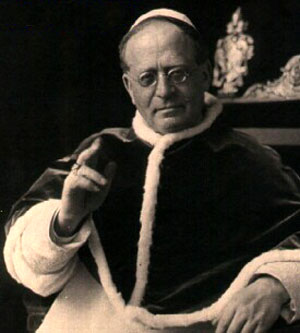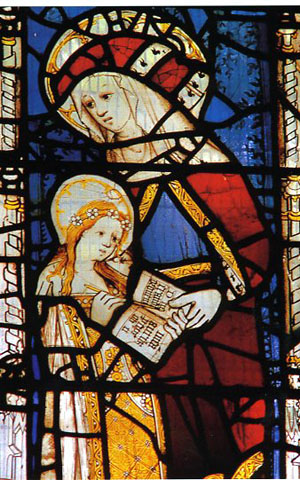 |
 |
Morals
Education for Heaven, Not for Hell
Focus on Encyclical Divini Illud Magistri
Eugene Mastroianni |
Children belong to those two parties who gave them life, namely their parents and the Blessed Trinity, with the former party subjected to the latter via the Catholic Church. Therefore, only the said parties ought to have main jurisdiction as to what shall, or shall not, enter the minds of students in general, although the State can set some minimum standards of literacy (in reading, writing, and mathematics) and of professional competence (such as in civil engineering). The Encyclical Divini Illius Magistri does recognize "civil society" to work in "due proportion" with the Church and the family in the matter of education. Unfortunately in these early years of the 21st century, civil society on average does not harmonize with sound Catholicism, to put it mildly.

Pope Pius XI
|
From general considerations, then, the jurisdiction in question should not fall into the hands - but it largely has - of the following subsets of people associated with public instruction and/or with civil government: boards and superintendents of education; supervisors of curricula; education committees at the State or federal levels; secretaries of education; provincial governors and legislatures; court judges; special task forces on education; the national government.
Even if these groups happened to have "noble motives and goals," clearly we have a case of – as the saying goes – "too many hands in the soup," thus increasing the probability for interminable discussions or debates at school board meetings and in politics. Moreover, and along the same vein, arises promptly the question, "What constitutes noble motives and goals?" The answer to this fundamental question depends entirely on one's religion and philosophy of life, but ultimately on religion. Given that in these United States exist hundreds of religions, public education at the elementary and secondary levels is inherently unworkable and untenable, especially for Catholics - unless parents simply do not care much on what enters – or does not enter – the minds of their offspring; but parents do have a serious obligation to be concerned.
In Catholic Religion, the purpose of our lives is to know-love-obey God, so as to be happy with Him forever in Heaven, in contradistinction to be suffering temporarily in Purgatory or forever in Hell, for not having satisfactorily fulfilled said purpose with the gifts and opportunities we had.
A major influence in our lives, for determining our next abode out of the aforementioned three possibilities, comes from the education we receive, since typically formal schooling lasts (say) for 10 – 20 academic years, whence for a significant percentage of an entire lifespan.
Therefore, given that the major and ultimate goal of education is eternal salvation, the field of teaching and learning must be guided by the one and only Church established by the Lord Jesus, namely the Catholic Church. This Institution has indeed spoken on the subject at various times in History. In particular, for the framework of this article, we refer to the 1929 Encyclical of Pope Pius XI Divini Illius Magistri, known in English as On the Christian Education of Youth.
“There remain therefore, in human nature the effects of original sin, the chief of which are weakness of will and disorderly inclinations. Folly is bound up in the heart of a child, and the rod of correction shall drive it away [Prov. 22: 15]. Disorderly inclinations then must be corrected, good tendencies encouraged and regulated from tender childhood, and above all the mind must be enlightened and the will strengthened by supernatural truth and by the means of grace, without which it is impossible to control evil impulses” (Pius XI, Divini Illius Magistri, Kansas City, MO: Angelus Press, 2000, p. 36).
Notice that corporal punishment taught in Proverbs above, as a help in curing misbehavior, comes from the Bible, and thus renders futile and erroneous the arguments against said punishment. Of course, the Pope quickly indicates that, ultimately, supernatural truth and the means of grace are necessary for good behavior. Now one of such means is sacramental Confession; but, what can the student confess if his four guides (parents, godparents, pastors, and teachers) teach very small amounts of Moral Theology?

Going to Heaven... above, St. Anne teaching Our Lady
Church of All Saints, York
|
Pius XI faces sex-education:
“Far too common is the error of those who …. propagate a so-called sex education" (p. 39).
Subsequently, the Pope refers to
"the experience of facts, from which it is clear that particularly in young people, evil practices are the effect not so much of ignorance of intellect as of weakness of a will exposed to dangerous occasions, and unsupported by the means of grace (ibid.).
In 2007, the arguments against classroom sex education are considerably stronger than they were in 1929 (the year of the Encyclical), because:
- The general level of morality in 2007 is much lower, whereupon a likely-stimulated sexual desire has weaker brakes, if any.
- Most schools are co-educational, rather than historically mono-gender; accordingly, in the teaching of this delicate subject, modesty becomes that much more difficult to maintain.
Instruction in the subject at hand, therefore, falls on the parents, in the privacy of their home. Since the formula for the creation and procreation of life was established by God, He and His Church's Morals must be brought into the scene whenever the father teaches the formula to his son, and likewise for the mother to her daughter, while both parents use their judgment on how far they can go, according to the age, maturity, or other, of their children. As with any other significant project, it's a good idea to pray for divine help beforehand.
Pius XI then condemns co-education:
“False also and harmful to Christian education is the so-called method of co-education"(p. 40).
The Pope indicates that since the two genders are different and complement each other in society, there cannot be nor ought to be "equality in the training of the two sexes "(ibid.).
In a co-educational classroom, that "cute" boy or that “attractive” girl can readily engender a distraction, or even a temptation, and both of these hamper the learning process, with the consequent loss of time and money. In turn, should the sympathetic exchange progress to affection and intimacy, the sin of lust has an easy and short path to traverse, especially in contemporary times when specific examples of sin, along with the harmful consequences and temporal punishment due to sin, are not prominent topics where they should be.
While the cultivation of a friendship for a possible holy marriage is not at all evil at some appropriate time and place, the three parties in question (students, parents, and school officials) must understand that young students are nowhere-near ready for marriage (Refer to my article on God in Marriage Preparation), wherefore the said affection and intimacy facilitate harm rather than good. Indeed, 44 years ago, good priests commenting on early dating, used to say: Early dating, early marriage, early divorce. I would add: God knows how many sins of impurity, how many pregnancies out of wedlock, how many babies killed via abortions, have been facilitated by mixing the genders in co-education which, worse still, takes places in shocking partial nudity!
Pope Pius XI here quotes the 1897 Encyclical of Pope Leo XIII, Militantis Ecclesiae:
"It is necessary not only that religious instruction be given to the young at certain fixed times, but also that every other subject taught, be permeated with Christian piety. If this is wanting, if this sacred atmosphere does not pervade and warm the hearts of masters and scholars alike, little good can be expected from any kind of learning, and considerable harm will often be the consequence" (pp. 46-47).
The Pope does not provide any specific examples of teaching secular subjects "permeated with Christian piety," but it is not difficult to imagine them. Parents and teachers should be Catholics and constantly refer to their faith in teaching even when they are not specifically dealing with religion.
These are some considerations that occur to me as a way to help our children to raise in order to go to Heaven.
The pleasure TIA has to publish collaborations of our guest columnists
does not imply that it endorses all the opinions expressed in their articles.
Return to TOP

Posted February 9, 2007

Related Articles of Interest
 Co-Education: a False and Harmful Method of Teaching Co-Education: a False and Harmful Method of Teaching
 Children of Mixed Marriages Children of Mixed Marriages
 God in Marriage Preparation God in Marriage Preparation
 Choosing a Spouse Choosing a Spouse
 How Should Children Receive Divorced Parents How Should Children Receive Divorced Parents
 Problems of Conscience: Live-ins, Baby Showers Problems of Conscience: Live-ins, Baby Showers
 How to Deal with Unwed Mothers How to Deal with Unwed Mothers
 A Refresher on Catholic Teaching about Marriage A Refresher on Catholic Teaching about Marriage
 Catholic Divorce Speeded Up Catholic Divorce Speeded Up
 The Wife's Submission to Her Husband The Wife's Submission to Her Husband

|
Morals | Religious | Home | Books | CDs | Search | Contact Us | Donate

© 2002-
Tradition in Action, Inc. All Rights Reserved
|
 |
|